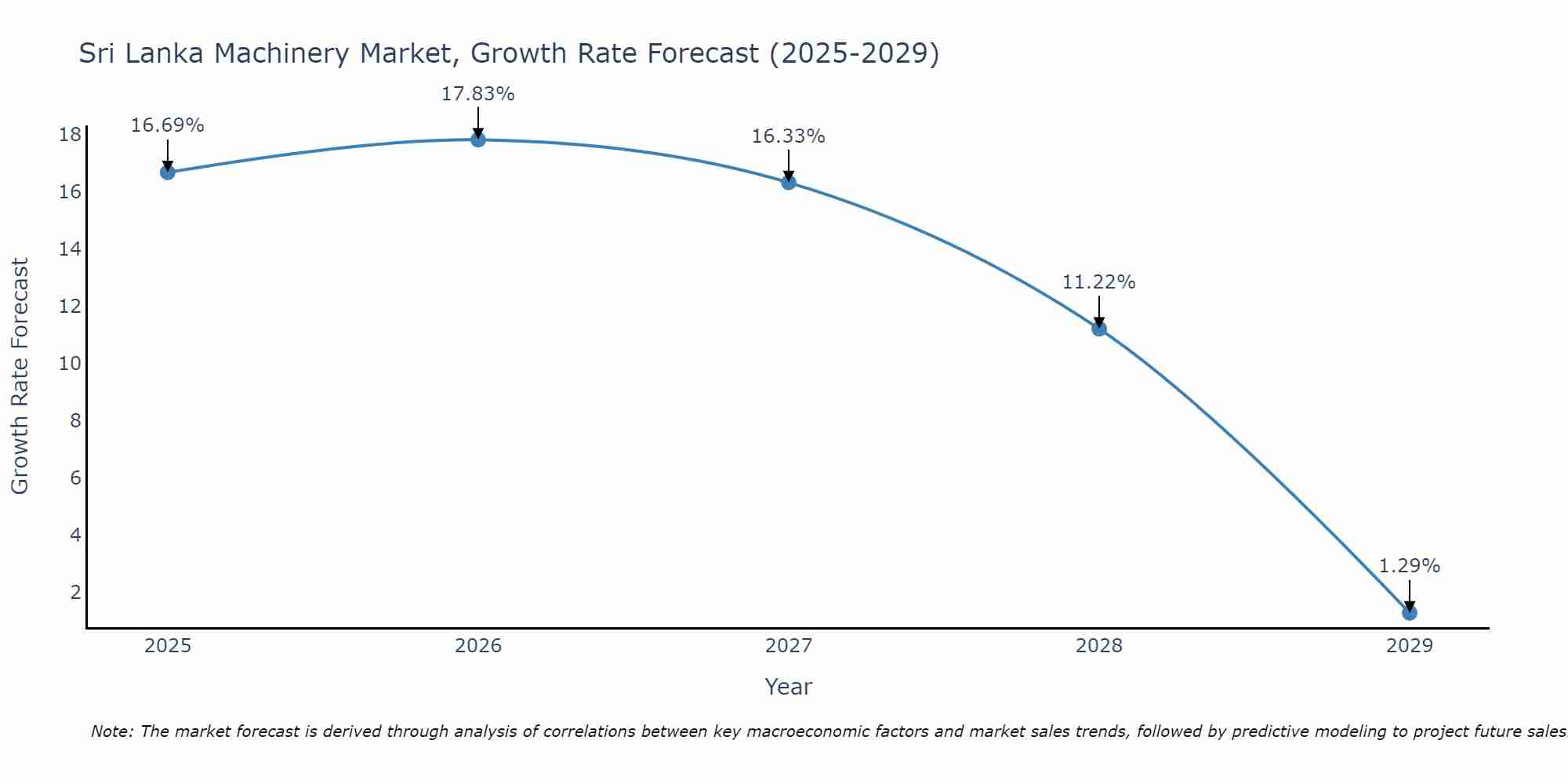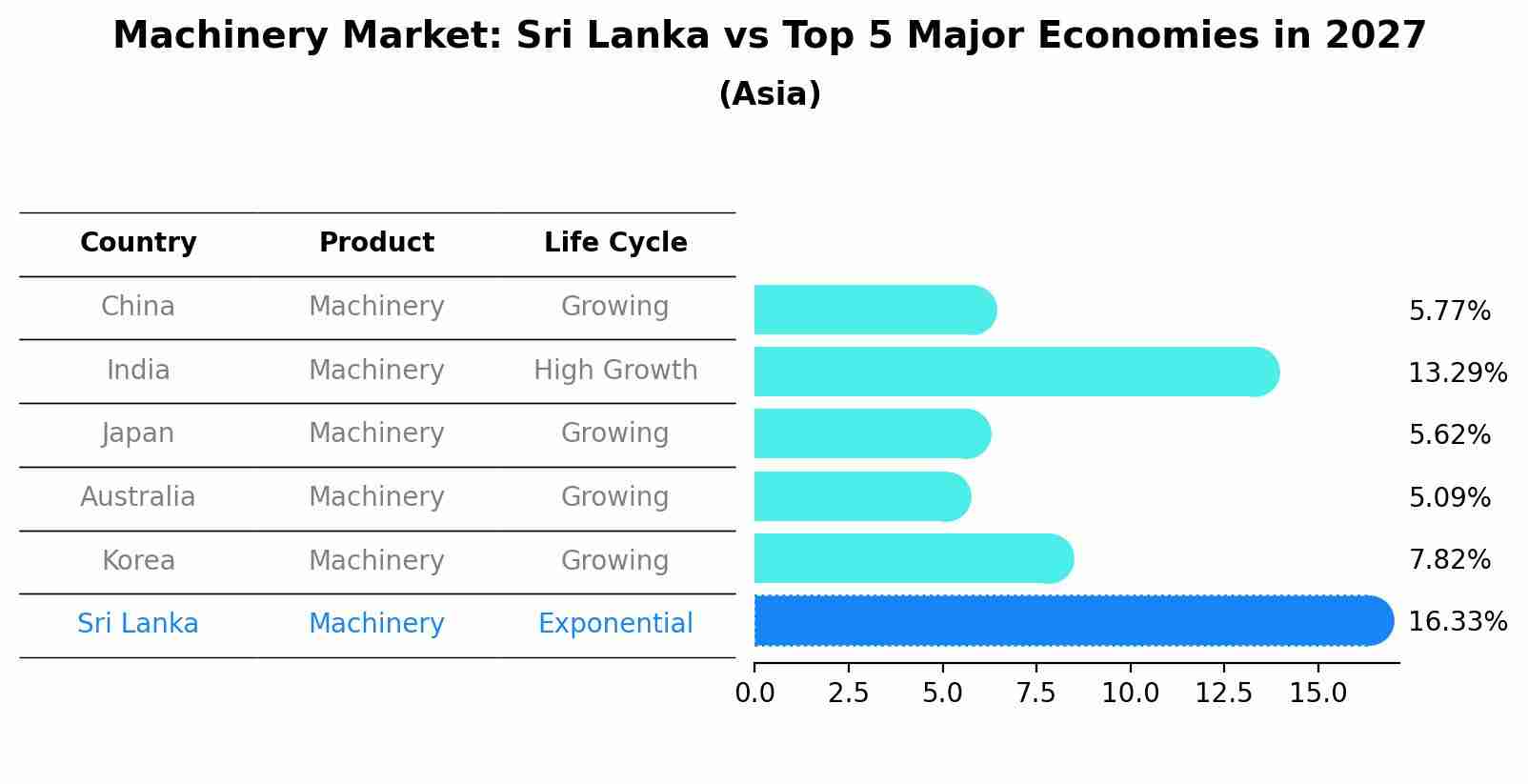Sri Lanka Machinery Market Outlook | Growth, Revenue, Companies, Value, Share, Forecast, Industry, COVID-19 IMPACT, Analysis, Size & Trends
| Product Code: ETC433167 | Publication Date: Oct 2022 | Updated Date: Jul 2025 | Product Type: Market Research Report | |
| Publisher: 6Wresearch | Author: Sachin Kumar Rai | No. of Pages: 75 | No. of Figures: 35 | No. of Tables: 20 |
Sri Lanka Machinery Market Size Growth Rate
The Sri Lanka Machinery Market is projected to witness mixed growth rate patterns during 2025 to 2029. Starting at 16.69% in 2025, the market peaks at 17.83% in 2026, and settles at 1.29% by 2029.

Machinery Market: Sri Lanka vs Top 5 Major Economies in 2027 (Asia)
By 2027, Sri Lanka's Machinery market is forecasted to achieve a exponential growth rate of 16.33%, with China leading the Asia region, followed by India, Japan, Australia and South Korea.

Sri Lanka Machinery Market Synopsis
The machinery market in Sri Lanka is characterized by steady growth due to increasing industrialization and infrastructure development in the country. Key sectors driving demand for machinery include construction, agriculture, manufacturing, and transportation. The market offers opportunities for both domestic and international manufacturers, with a focus on quality and efficiency. Local manufacturers cater to the demand for agricultural machinery, construction equipment, and industrial machinery, while imports are significant for specialized machinery and advanced technology. The government`s initiatives to promote foreign investment and industrial development further support the growth of the machinery market in Sri Lanka. However, challenges such as high import taxes, limited access to finance, and competition from cheaper alternatives pose hurdles for market players. Overall, the machinery market in Sri Lanka presents promising prospects for growth and innovation.
Sri Lanka Machinery Market Trends
The machinery market in Sri Lanka is experiencing a shift towards more technologically advanced and efficient equipment. There is a growing demand for automation and digitalization in various industries such as manufacturing, construction, and agriculture. This trend is driven by the need for increased productivity, cost efficiency, and quality control. Additionally, there is a focus on sustainability and environmental considerations, leading to a rise in the adoption of eco-friendly machinery and equipment. The market is also witnessing a rise in the demand for machinery rental services as businesses seek flexibility and cost-effective solutions. Overall, the machinery market in Sri Lanka is evolving to meet the changing demands of industries, with a strong emphasis on innovation and sustainability.
Sri Lanka Machinery Market Challenges
In the Sri Lanka Machinery Market, some key challenges include high import tariffs on machinery, which increase the overall cost of machinery for businesses. This makes it difficult for companies to invest in new equipment and technology, hindering their ability to improve productivity and competitiveness. Additionally, there may be issues related to inconsistent government regulations and policies, which can create uncertainty for companies operating in the market. The lack of skilled labor and technical expertise to operate and maintain advanced machinery is another challenge faced by businesses in Sri Lanka. Overall, these challenges can impact the growth and development of the machinery market in Sri Lanka, requiring strategic solutions and support from the government and industry stakeholders.
Sri Lanka Machinery Market Investment Opportunities
The Sri Lanka Machinery Market presents several investment opportunities across various sectors including agriculture, construction, manufacturing, and transportation. With the country`s growing infrastructure development projects and increasing industrial activities, there is a rising demand for machinery and equipment. Investors can explore opportunities in supplying construction machinery such as excavators, cranes, and concrete mixers, agricultural machinery like tractors and irrigation systems, as well as manufacturing equipment for small and medium enterprises. Additionally, the government`s initiatives to promote renewable energy sources and modernize the transportation sector create openings for investments in machinery related to these sectors. Partnering with local businesses or setting up distribution channels can be strategic approaches to capitalize on the evolving market trends in the Sri Lanka Machinery Market.
Jordan Agar Market Government Policies
The Sri Lankan government has implemented various policies to support the Machinery Market in the country. The government has introduced tax incentives and duty reductions on imported machinery to encourage local industries to invest in modern equipment and technology. Additionally, the government has focused on promoting local manufacturing of machinery through initiatives such as the "Buy Sri Lankan Build Sri Lanka" campaign, which aims to boost domestic production and reduce reliance on imports. Furthermore, the government has established partnerships with international organizations to provide technical assistance and training programs for local machinery manufacturers to enhance their competitiveness in the global market. Overall, these policies demonstrate the government`s commitment to developing and supporting the Machinery Market in Sri Lanka.
Sri Lanka Machinery Market Future Outlook
The future outlook for the Sri Lankan Machinery Market appears positive, driven by increasing industrialization and infrastructure development initiatives in the country. The government`s focus on promoting sectors such as construction, manufacturing, and agriculture is expected to drive the demand for machinery and equipment. Additionally, the growing trend of automation and technological advancements in the machinery sector are likely to further boost market growth. However, challenges such as fluctuating raw material prices, regulatory changes, and global economic uncertainties may impact market dynamics. Overall, the Sri Lankan Machinery Market is projected to witness steady growth in the coming years, presenting opportunities for both domestic and foreign machinery manufacturers to capitalize on the expanding market.
Key Highlights of the Report:
- Sri Lanka Machinery Market Outlook
- Market Size of Sri Lanka Machinery Market, 2021
- Forecast of Sri Lanka Machinery Market, 2031
- Historical Data and Forecast of Sri Lanka Machinery Revenues & Volume for the Period 2018 - 2031
- Sri Lanka Machinery Market Trend Evolution
- Sri Lanka Machinery Market Drivers and Challenges
- Sri Lanka Machinery Price Trends
- Sri Lanka Machinery Porter's Five Forces
- Sri Lanka Machinery Industry Life Cycle
- Historical Data and Forecast of Sri Lanka Machinery Market Revenues & Volume By Type for the Period 2018 - 2031
- Historical Data and Forecast of Sri Lanka Machinery Market Revenues & Volume By Agriculture, Construction, And Mining Machinery for the Period 2018 - 2031
- Historical Data and Forecast of Sri Lanka Machinery Market Revenues & Volume By Industrial Machinery for the Period 2018 - 2031
- Historical Data and Forecast of Sri Lanka Machinery Market Revenues & Volume By Commercial And Service Industry Machinery for the Period 2018 - 2031
- Historical Data and Forecast of Sri Lanka Machinery Market Revenues & Volume By Ventilation for the Period 2018 - 2031
- Historical Data and Forecast of Sri Lanka Machinery Market Revenues & Volume By Heating for the Period 2018 - 2031
- Historical Data and Forecast of Sri Lanka Machinery Market Revenues & Volume By Air-Conditioning for the Period 2018 - 2031
- Historical Data and Forecast of Sri Lanka Machinery Market Revenues & Volume By Commercial Refrigeration Equipment for the Period 2018 - 2031
- Historical Data and Forecast of Sri Lanka Machinery Market Revenues & Volume By Distribution Channel for the Period 2018 - 2031
- Historical Data and Forecast of Sri Lanka Machinery Market Revenues & Volume By Supermarkets/Hypermarkets for the Period 2018 - 2031
- Historical Data and Forecast of Sri Lanka Machinery Market Revenues & Volume By Convenience Stores for the Period 2018 - 2031
- Historical Data and Forecast of Sri Lanka Machinery Market Revenues & Volume By E-Commerce for the Period 2018 - 2031
- Historical Data and Forecast of Sri Lanka Machinery Market Revenues & Volume By Others for the Period 2018 - 2031
- Historical Data and Forecast of Sri Lanka Machinery Market Revenues & Volume By Others for the Period 2018 - 2031
- Historical Data and Forecast of Sri Lanka Machinery Market Revenues & Volume By Nature for the Period 2018 - 2031
- Historical Data and Forecast of Sri Lanka Machinery Market Revenues & Volume By Organic for the Period 2018 - 2031
- Historical Data and Forecast of Sri Lanka Machinery Market Revenues & Volume By Conventional for the Period 2018 - 2031
- Sri Lanka Machinery Import Export Trade Statistics
- Market Opportunity Assessment By Type
- Market Opportunity Assessment By Distribution Channel
- Market Opportunity Assessment By Nature
- Sri Lanka Machinery Top Companies Market Share
- Sri Lanka Machinery Competitive Benchmarking By Technical and Operational Parameters
- Sri Lanka Machinery Company Profiles
- Sri Lanka Machinery Key Strategic Recommendations
Frequently Asked Questions About the Market Study (FAQs):
- Single User License$ 1,995
- Department License$ 2,400
- Site License$ 3,120
- Global License$ 3,795
Search
Thought Leadership and Analyst Meet
Our Clients
Related Reports
- Canada Oil and Gas Market (2026-2032) | Share, Segmentation, Value, Industry, Trends, Forecast, Analysis, Size & Revenue, Growth, Competitive Landscape, Outlook, Companies
- Germany Breakfast Food Market (2026-2032) | Industry, Share, Growth, Size, Companies, Value, Analysis, Revenue, Trends, Forecast & Outlook
- Australia Briquette Market (2025-2031) | Growth, Size, Revenue, Forecast, Analysis, Trends, Value, Share, Industry & Companies
- Vietnam System Integrator Market (2025-2031) | Size, Companies, Analysis, Industry, Value, Forecast, Growth, Trends, Revenue & Share
- ASEAN and Thailand Brain Health Supplements Market (2025-2031) | Strategy, Consumer Insights, Analysis, Investment Trends, Opportunities, Growth, Size, Share, Industry, Revenue, Segments, Value, Segmentation, Supply, Forecast, Restraints, Outlook, Competition, Drivers, Trends, Demand, Pricing Analysis, Competitive, Strategic Insights, Companies, Challenges
- ASEAN Bearings Market (2025-2031) | Strategy, Consumer Insights, Analysis, Investment Trends, Opportunities, Growth, Size, Share, Industry, Revenue, Segments, Value, Segmentation, Supply, Forecast, Restraints, Outlook, Competition, Drivers, Trends, Demand, Pricing Analysis, Competitive, Strategic Insights, Companies, Challenges
- Europe Flooring Market (2025-2031) | Outlook, Share, Industry, Trends, Forecast, Companies, Revenue, Size, Analysis, Growth & Value
- Saudi Arabia Manlift Market (2025-2031) | Outlook, Size, Growth, Trends, Companies, Industry, Revenue, Value, Share, Forecast & Analysis
- Uganda Excavator, Crane, and Wheel Loaders Market (2025-2031) | Strategy, Consumer Insights, Analysis, Investment Trends, Opportunities, Growth, Size, Share, Industry, Revenue, Segments, Value, Segmentation, Supply, Forecast, Restraints, Outlook, Competition, Drivers, Trends, Demand, Pricing Analysis, Competitive, Strategic Insights, Companies, Challenges
- Rwanda Excavator, Crane, and Wheel Loaders Market (2025-2031) | Strategy, Consumer Insights, Analysis, Investment Trends, Opportunities, Growth, Size, Share, Industry, Revenue, Segments, Value, Segmentation, Supply, Forecast, Restraints, Outlook, Competition, Drivers, Trends, Demand, Pricing Analysis, Competitive, Strategic Insights, Companies, Challenges
Industry Events and Analyst Meet
Whitepaper
- Middle East & Africa Commercial Security Market Click here to view more.
- Middle East & Africa Fire Safety Systems & Equipment Market Click here to view more.
- GCC Drone Market Click here to view more.
- Middle East Lighting Fixture Market Click here to view more.
- GCC Physical & Perimeter Security Market Click here to view more.
6WResearch In News
- Doha a strategic location for EV manufacturing hub: IPA Qatar
- Demand for luxury TVs surging in the GCC, says Samsung
- Empowering Growth: The Thriving Journey of Bangladesh’s Cable Industry
- Demand for luxury TVs surging in the GCC, says Samsung
- Video call with a traditional healer? Once unthinkable, it’s now common in South Africa
- Intelligent Buildings To Smooth GCC’s Path To Net Zero


















